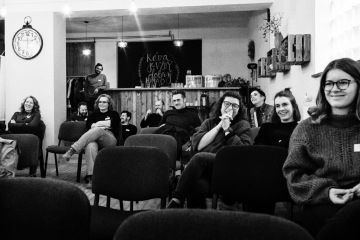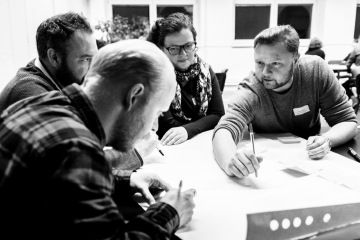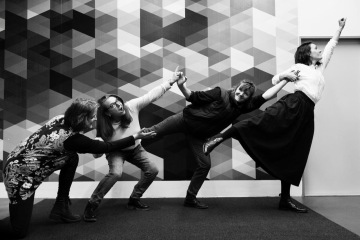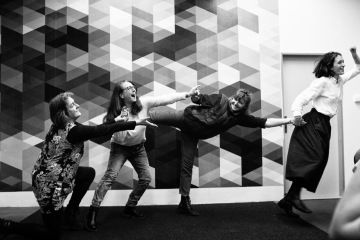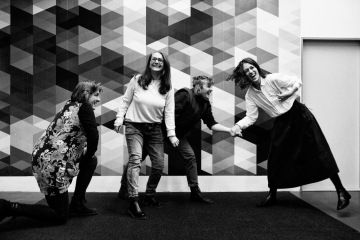(PERMA)CULTURAL FORUM: Looking to the future and planning
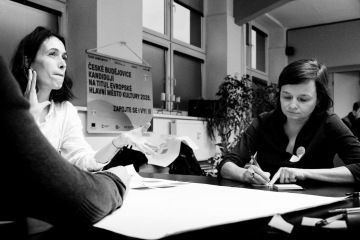
České Budějovice is in the final of the competition for the title of European Capital of Culture. It is competing for the title together with several French cities and in competition with Broumov. In June 2023, an expert committee at the EU level will select the winning cities - one from the Czech Republic and one from France. The theme of České Budějovice's candidacy is (PERMA)CULTURE - defined as a sustainable, holistic and locally rooted approach to cultural planning, management and operation.
The competition for the title of European Capital of Culture is above all an opportunity to change the position of culture and art in the city and the region. It is also a chance to connect the city's inhabitants with European culture and to introduce local culture to Europe. The aim is to improve life in the city through cultural and artistic projects. The plan for change was noted in the application for the competition, the so-called Bid Book. This plan was developed by a team of cultural strategy and planning experts together with many people from the city - for example politicians, artists, teachers, scientists, social workers, residents from different neighbourhoods. Together, we named the city's problems and opportunities and developed a plan for change. We chose a permaculture environment as a metaphor to describe the change.
Permaculture is originally an agricultural term expressing a type of long-term planning. Its goal is to create a sustainable process that provides sufficient resources while not destroying them. Permaculture principles can be applied to all human actions, to every area of human activity. In such a system, people are considerate of each other and the environment in which they live and create.
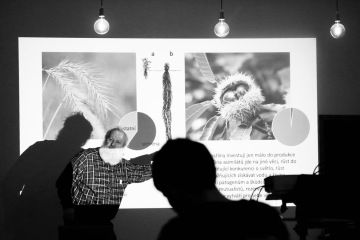
Why permaculture?
Permaculture principles are so inspiring to us, and at the same time functional and natural, that we decided to transfer them to the field of culture - to print them in our application for the competition. Particularly in České Budějovice - in the heart of a region traditionally associated with agriculture, but also with pure nature, holidays, a peaceful lifestyle or the unique architectural treasure of rural baroque - this approach has its justification.
The application of permaculture principles to cultural planning is new in our context, but at the same time it is not an unpredictable experiment. All our actions are based on professional publications and a network of international consultants. Permaculture gives us a fixed framework that we are also able to tailor to our environment. Thus applied, we use the term (PERMA)CULTURE in this form.
Our goal is to create an environment that is resilient and adaptable. It is stable and sustainable in the long term. (PERMA)CULTURE city has a conscious leadership and works with its officials. It creates the conditions for residents and their activities that allow them to create and act according to permaculture principles. These relate mainly to three categories - care for the land, care for the people and care for the future.
In a (PERMA)CULTURAL environment, people and institutions are interconnected. They look to the future, they plan strategically, but they also have big dreams. They make use of local resources. They are open to every opinion and include all audiences. Neighbors from the same street or neighborhood come together to think about their neighborhood while being active. Communities and organizations inspire each other. Institutions share their experiences and opportunities with each other. This happens through joint care for public space (for example, by involving residents in decision-making), through meeting each other (for example, at neighbourhood festivals), but also through the creation of sub-strategic documents (which helps in meeting long-term goals).
(PERMA)CULTURAL FORUM
26. - 27. 1. 2023
At the end of January we organized a meeting called (PERMA)CULTURAL FORUM. Its aim was to introduce in more detail the concept of permaculture, permaculture principles and their translation into the space of the city and the region. We composed the forum's program in such a way that its participants got acquainted with the concept of permaculture and its principles in its entirety - from the original agricultural concept, through the application of this sustainable concept to the way of life in the city, to the application to culture. Coming together, sharing and discussing are indispensable for the creation of our application.
The first guest of the forum was Jan Frouz, who presented a paper entitled Landscape conservation and restoration: current challenges and forecast to 2035. His presentation covered soil in the landscape, restoration in severely damaged sites, restoration of landfill sites, and the impact of agriculture and forestry on soil.
The other two papers applied permaculture principles to urban planning and education. Adéla Hrubá shared her knowledge from her position as a member of the Czech Permaculture Institute (Český permakulturní institut )and the international project Children in permaculture. Tomáš Smrž complemented this with the perspective of the local non-profit organization Cassiopeia. The aim of all these organisations is to improve children's education, integrate permaculture into the school curriculum and create the necessary materials to do so. Adéla Hrubá presented permaculture as a path to an ethical and ecological future. This is done by actively creating a functional network (ecosystem) that provides sufficient resources, thus creating a self-sustaining environment.
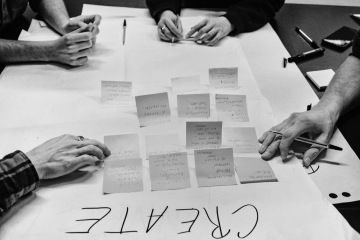
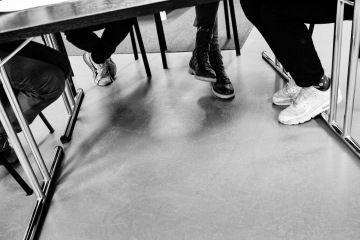
Culture is an investment - in society, but also in the development of the city
Petr Peřinka, Director of Creative Prague, presented the main principles and limits of cultural strategies and urban planning. According to his experience, the problem is not the lack of cultural strategies, but their implementation. When creating strategies, we often forget about the people who are supposed to implement the plan. The plan with which we are bidding for the title of ECoC is consciously working with this weakness: "We have several challenges ahead of us. I see one of the biggest challenges as taking care of the process of implementing the strategy itself. Equally important is the care for the people who are supposed to implement the strategy," Peřinka stressed during his presentation. According to him, the second challenge is based on the fact that České Budějovice has no urgent problem that needs to be solved. So why bring a permaculture concept into such an environment? The reason is to try to break the city out of inertia and allow new projects to emerge. Only in this way will the city/county/residents be able to develop further. We must not be afraid to take this first step beyond our comfort zone.
Alice Koubova, philosopher, member of Národní institut SYRI (National Institute for Socioeconomic Impact Research on Illness and Systemic Risk), continued with her contribution on the culture of relationships. Koubová followed Petr Perinka with the topic of resilience, which has long been a part of her professional work. Koubová presented to the audience the results of her research, which collected data from different European countries through a questionnaire survey on the feeling of satisfaction, sense of security and belief in a better future. The Czech Republic ranks first in terms of satisfaction with the country and sense of security. On the other hand, we are at the bottom with feelings about the future. Why is this so? According to Koubová, this is due to the fact that if a given society is doing well, it has no motivation to embark on new things because it is afraid of losing its comfort. This may be related to the challenge mentioned by Petr Peřinka, which is about implementing cultural strategies.
On this topic, we recommend reading the interview with Alice Koubová, which she gave us before the forum started.
(PERMA)CULTURAL FORUM was closed by international guest Agata Etmanowicz, Director of Impact Foundation Poland. In her presentation entitled Culture as Care, she offered many examples of good practice from her previous collaborations. Etmanowicz has worked on strategies with a number of ECoC - for example Kaunas 2022 or currently Trenčín 2026. Her presentation was followed by a workshop with the forum participants. It allowed us to continue collecting data regarding the needs and wishes of representatives of cultural institutions. Many of the needs and issues shared by the participants were combined into more complex units that we will address when writing the application for the second round. We will keep more detailed information to ourselves and forum participants for now.
Finally, we would like to thank all the forum participants, the speakers and the organizing team. We are delighted that we are expanding our circle of partners and continuing to work together in preparation for the second round.
